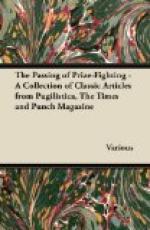* * * * *
A short hour’s reading and you will have laid down, with a sigh for its brevity, a little book that is a very model of artistry. It is by Mr. E.V. LUCAS, and Outposts of Mercy is its happy name. But I am not to seek reflected glory by the praising of a colleague; simply for the sake of the cause that he pleads I wish to commend this fascinating account of the author’s visit, in the company of Lord MONSON, Chief Commissioner, to the stations of the British Red Cross on the Carso, at Gorizia and among the Carnic and Julian Alps. Resisting sternly the temptation to embroider his theme with the distractions of scene and circumstance (of course he had to tell us of that dinner at the mess of an Alpine regiment where he met the man who had discovered the “Venus of Cyrene"), he keeps as closely as may be to his main subject, but cannot escape from infusing it with his own sense of colour and romance and the unconscious appeal of his personality. One may envy him his rare experience, yet fully share his pride in the fearless devotion of the men and women of our race (one can imagine it of no other) in these perilous and lonely outposts of mercy. A little paper book, illustrated with little photographs, and costing just a shilling. The author and his publishers (METHUEN) are devoting the profits to the British Red Cross; so you who buy and read it—and I don’t see how anybody can refuse—may extract a claim to virtue from an hour of pure delight.
* * * * *
A quiet style, keen powers of observation, and a delightful assumption of his own unimportance combine to make Mr. FREDERICK PALMER’S With the New Army on the Somme (MURRAY) a book that will be read long after the Hun has returned to the place from which he came. “Those whose business it was to observe, the six correspondents ... went and came always with a sense of incapacity and sometimes with a feeling that writing was a worthless business when others were fighting.” There we have his apology for doing what obviously seemed to him a second-best thing; but much as I like his modesty I can assure him that no finer tribute has yet been paid to our new army. Mr. PALMER was the accredited American correspondent at the British Front, and though the days are happily passed when he was a neutral in name his position as an impartial spectator gives him an advantage denied to the most veracious of our own correspondents. Our French Allies too may be congratulated, by themselves as well as by us, on being observed by eyes so shrewd and friendly. “No two French soldiers seem quite alike on the march or when moving about a village on leave. Each seems three beings—one a Frenchman, one a soldier, a third himself.” Anyone who has been in the war-zone and seen a French regiment resting cannot fail to be struck by the acuteness of this remark; indeed it provides the key to what, for an ordinary British mind, is a puzzle. It is one of Mr. PALMER’S many virtues that, although his main business was to watch the soldiers and the fighting, he never forgets the man inside the uniform. This gives to his historical record the added interest of a study in psychology.




